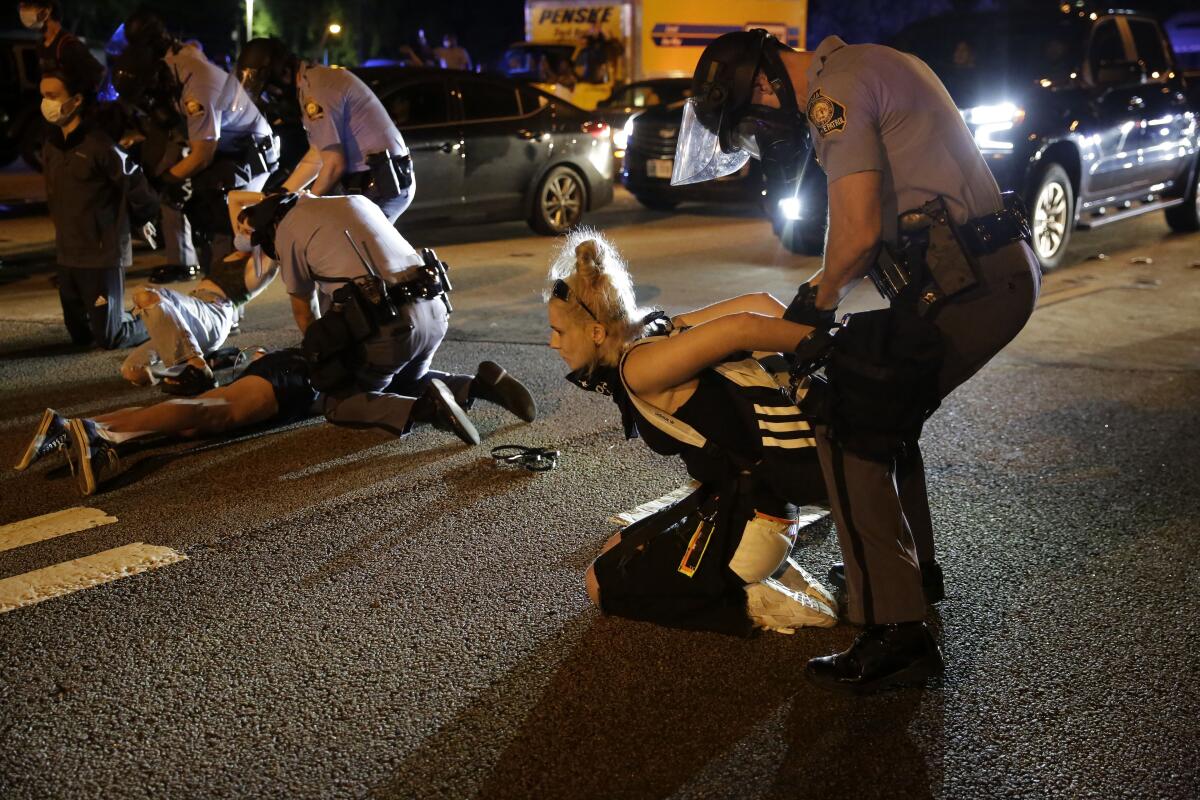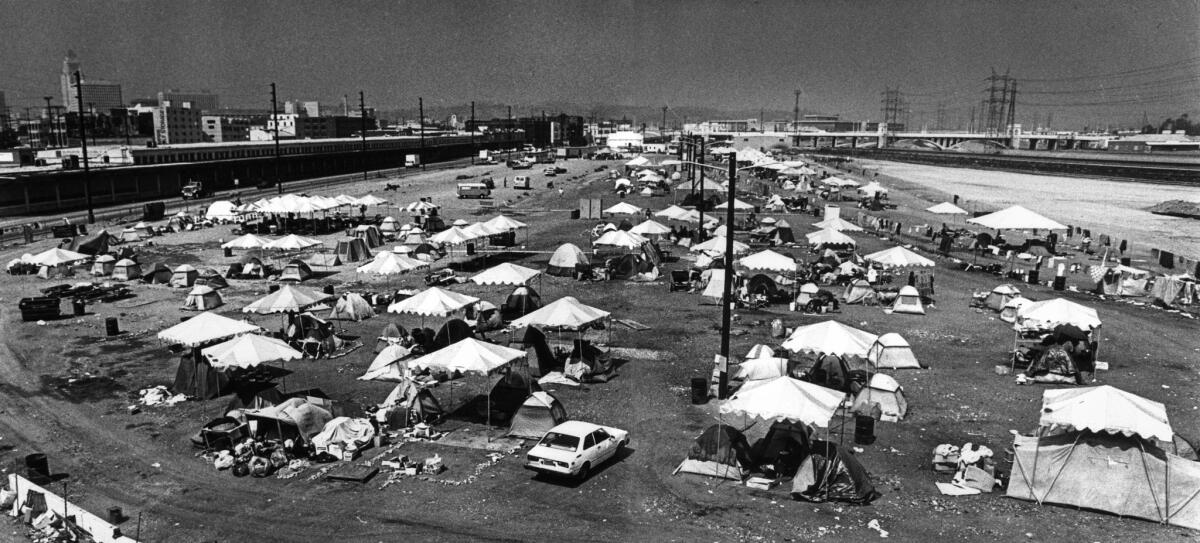Newsletter: The uneven path to police reform

- Share via
On Capitol Hill, there will be more debate over police reform; in Los Angeles, there are more questions.
TOP STORIES
The Uneven Path to Police Reform
Another police killing of a Black man, this time in Atlanta. Another weekend of protests across the nation, including an “All Black Lives Matter” march through Hollywood denouncing racial injustice and supporting LGBTQ rights. Another clash ahead, in the halls of power, over police reform.
Start your day right
Sign up for Essential California for the L.A. Times biggest news, features and recommendations in your inbox six days a week.
You may occasionally receive promotional content from the Los Angeles Times.
In Washington, D.C., Republican allies of President Trump and Democratic lawmakers are squaring off over federal legislation that is expected to be a focal point this week in the House and the Senate. House Democrats are calling for a ban on police chokeholds, an end to no-knock warrants and the creation of a national police misconduct registry, among other steps. In the Senate, the chamber’s only Black Republican, Sen. Tim Scott of South Carolina, plans to unveil a measure.
But as Los Angeles has shown, the path to police reform is seldom straightforward. Amid the mass protests that erupted after the killing of George Floyd by a police officer in Minneapolis, the tactics of the L.A. Police Department and the L.A. County Sheriff’s Department have come under increased scrutiny.
Videos and accounts of LAPD officers beating back seemingly peaceful protesters with batons and injuring others with “less lethal” projectiles have led to questions about whether the LAPD should have been better prepared and could have responded in a way that eased tensions instead of ratcheting them up. The heavy-handed response has
also raised questions about a decade of reforms meant to counter the LAPD’s past reputation for brutality.
Meanwhile, L.A. County Sheriff Alex Villanueva has taken to social media to say how his department has embraced progressive force policies. But some of the eight policies he listed, including the duty to intervene when another officer is using excessive force, aren’t explicitly spelled out in the manual for patrol deputies, which experts say makes them nearly impossible to enforce.
Since taking office in December 2018, Villanueva has also reinstated deputies who were fired for dishonesty or using unreasonable force, and he has snubbed transparency laws, refusing to publicly release records as required by law about misconduct within his ranks.
Pepper-Sprayed at the White House
Imani Williams wants you to know what happened when officers cleared the way for Trump to walk to St. John’s Episcopal Church so he could be photographed holding a Bible and looking stern.
In the aftermath of the Washington, D.C., protest, Trump and his staff denied that authorities used tear gas to drive the crowd out of Lafayette Park. “No tear gas was used, and no rubber bullets were used,” White House press secretary Kayleigh McEnany told reporters two days later. “FAKE NEWS!” the president tweeted.
But Williams, a 22-year-old from Fresno, wants you to know about the clouds of gas, the sting of the baton, the thud of the rubber bullet against her body, how fast her heart beat as police horses bore down.
Her eyes are no longer swollen from the pepper spray law enforcement agents used on the largely peaceful crowd. But the deep bruise on her left hip had not gone away more than a week later.
A Failure to Warn
In March, when L.A. was still in an early stage of the COVID-19 pandemic, two long-haul flights into Los Angeles International Airport — one from New York, the other from Seoul — each included a person who later was found to have the disease, and public health officials failed to alert passengers and crew who had flown with them, a Times investigation has found.
Without instructions to self-quarantine or seek testing, more than 200 people on these flights returned to their families and communities ignorant of their exposure, potentially seeding new outbreaks.
Yet at the time, local health officials were regularly assuring the public that L.A. County was investigating each case and engaging in aggressive contact tracing to control the spread of the virus.
The mishandling of these cases raises concerns about how well public officials have carried out contact tracing thus far and whether they are prepared for an expected uptick in cases as California reopens. The state now has more than 140,000 confirmed COVID-19 cases.
More Top Coronavirus Headlines
— Fears of a second wave of coronavirus infections struck China’s capital city as a new cluster was discovered over the weekend.
— Health experts are questioning Trump’s plan to hold a rally in Tulsa, Okla., on Saturday. Trump pushed back the rally by one day after an uproar about it having been originally planned on Juneteenth.
— In Southern California, the industrial city of Vernon has about as many coronavirus cases as residents. Most of the workers come from neighboring cities.
— What does dining at L.A. restaurants look like now? Here’s what COVID-19 means for sushi, dim sum, buffets, Ethiopian restaurants and even matchbooks.
For more, sign up for Coronavirus Today, a special edition of The Times’ Health and Science newsletter.
Two Deaths, Not Enough Answers
About two weeks ago, Malcolm Harsch was found hanging from a tree near the Victorville City Library. Last week, Robert Fuller was found hanging from a tree in a park near Palmdale City Hall. Both were young Black men.
The San Bernardino County Sheriff’s Department has said that foul play was not suspected in the Victorville death, but the department told a local news outlet that the investigation remains ongoing. Harsch’s family has said they find it hard to accept that his death was a suicide.
In Palmdale, the L.A. County medical examiner-coroner’s office initially labeled Fuller’s death a suicide, but his family and civic leaders quickly pushed back, insisting that it be investigated as a homicide and demanding an independent probe and autopsy. Now, two state officials have joined a county supervisor in calling on California Atty. Gen. Xavier Beccera to investigate.
FROM THE ARCHIVES
On this date in 1987, a temporary site to relocate homeless people in Los Angeles opened on a dusty strip of vacant land downtown near the L.A. River. Mayor Tom Bradley, who had proposed the site after the LAPD cracked down on skid row homeless encampments, called it an “urban campground.” Some who worked at the site described the conditions as unsanitary and a poor environment for children.
Within two weeks, about 500 homeless people were at the site. Social service agencies sought to help. Schooling and daycare were provided for children.
On Sept. 25, 1987, the site was closed, and as a Times article reported, “No one calls the attempt a success — not the city, the Salvation Army or advocates for the homeless.”

CALIFORNIA
— The state gas tax is set to increase July 1, but some lawmakers are calling for a freeze, citing the financial burden of the coronavirus-spawned recession.
— The city of Beverly Hills issued an order restricting nighttime assemblies after a noisy protest disturbed residents.
— Floyd Zaiger, a prolific fruit breeder in Modesto who brought new flavors to our lives, has died at 94.
— Some social distancing with your Chardonnay? Wineries are reopening across the state.
Support our journalism
Subscribe to the Los Angeles Times.
NATION-WORLD
— Days after pulling Pentagon leaders into a much criticized photo op and stirring up arguments over the legacy of Confederate leaders on military bases, Trump told graduating West Point cadets that America’s institutions are strongest when they steer clear of societal flash points.
— Fox News has removed digitally altered photos from its website after the Seattle Times noted misleading images in the network’s coverage of a Seattle neighborhood that’s become a protest center against police brutality and racial injustice.
— A trial court in Manila has convicted Philippine American journalist Maria Ressa of libel, dealing a severe blow to press freedom in the Philippines under its strongman president.
— For many people in Chile, the demonstrations in the U.S. remind them of protests for justice that disrupted the country last year.
HOLLYWOOD AND THE ARTS
— Dave Chappelle’s latest performance isn’t a stand-up routine. It’s an impassioned, 27-minute set that speaks to the cultural reckoning triggered by the killing of George Floyd.
— The motion picture academy has unveiled a fresh set of measures aimed at boosting representation within the group and across the film industry as a whole.
— “Rough and Rowdy Ways” is Bob Dylan’s first album of new material in eight years. Our pop music critic says it’s a savage pulp-noir masterpiece.
— Maude Apatow, daughter of director Judd Apatow, knows you think she’s a product of nepotism. She wants to prove herself as an actress.
BUSINESS
— Nike, the NFL and other businesses will give their employees a day off for Juneteenth for the first time this year. It’s the latest example of how American employers are responding to protests that have placed additional attention on racial injustice in the U.S.
— Dumpling, a smaller competitor to Instacart, can be a better deal for personal shoppers.
SPORTS
— Lakers center Dwight Howard is concerned that the NBA’s return might distract from more important matters.
— If there is a baseball season, MLB is expected to implement the designated hitter across the board to alleviate players’ workloads during a sprint to play as many games as possible in a short period of time.
Free online games
Get our free daily crossword puzzle, sudoku, word search and arcade games in our new game center at latimes.com/games.
OPINION
— In L.A. County, Black people represent 7.9% of the population, but 34% of the homeless population. Columnist Steve Lopez asks: Are we willing to do more than protest and and embrace “racial equity” policymaking?
— The NFL. NASCAR. Floyd’s death has inspired a sports reckoning too. Will it last? Columnist LZ Granderson says the most important part will come in how sports leagues follow through.
WHAT OUR EDITORS ARE READING
— A prominent women’s hospital in Albuquerque has separated some Native American women from their newly born babies, according to clinicians — the result of a practice designed to stop the spread of COVID-19 that some describe as racial profiling. (ProPublica)
— In Sri Lanka, archaeologists have found ancient tools they believe are among the oldest survival gear humans used in rainforests. (National Geographic)
ONLY IN L.A.
Guilford Adams drives a blue PT Cruiser with license plates that read “LA CLWN,” short for Los Angeles Clown Co. For 20 years, he’s dedicated himself to making children laugh. Then came the coronavirus, and the gigs dried up. Losing work is just one of the challenges that party clowns are having to deal with — learning how to perform in the new normal, with masks and social distancing, is another. “If you’re a clown,” Adams said, “you’re used to falling down and picking yourself up.”
Comments or ideas? Email us at [email protected].
Sign up for Essential California
The most important California stories and recommendations in your inbox every morning.
You may occasionally receive promotional content from the Los Angeles Times.



